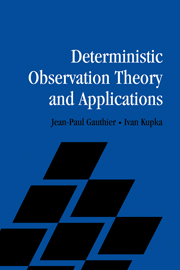Book contents
- Frontmatter
- Contents
- Preface
- 1 Introduction
- Part I Observability and Observers
- 2 Observability Concepts
- 3 The Case dy ≤ du
- 4 The Case dy > du
- 5 Singular State-Output Mappings
- 6 Observers: The High-Gain Construction
- Part II Dynamic Output Stabilization and Applications
- Appendix
- Solutions to Part I Exercises
- Bibliography
- Index of Main Notations
- Index
3 - The Case dy ≤ du
Published online by Cambridge University Press: 14 August 2009
- Frontmatter
- Contents
- Preface
- 1 Introduction
- Part I Observability and Observers
- 2 Observability Concepts
- 3 The Case dy ≤ du
- 4 The Case dy > du
- 5 Singular State-Output Mappings
- 6 Observers: The High-Gain Construction
- Part II Dynamic Output Stabilization and Applications
- Appendix
- Solutions to Part I Exercises
- Bibliography
- Index of Main Notations
- Index
Summary
We will treat only the case dy = 1, du ≥ 1. General results for the case du ≥ dy > 1 are more difficult to obtain. However, Chapter 8 gives two nontrivial practical examples, where dy = du = 2, which are uniformly infinitesimally observable.
In this chapter, with the exception of the first section, we assume that dy = 1, du ≥ 1, and that everything is analytic. We characterize analytic systems that are uniformly infinitesimally observable when restricted to an open dense subset of X. The necessary and sufficient condition is that ∂uD(u) = 0, i.e., the canonical flag is uniform. This condition ∂uD(u) = 0 is extremely restrictive and is not preserved by small perturbations of the system.
The analyticity assumption with respect to the x variable is made for purely technical reasons. It can certainly be removed to get similar results (see Exercise 4.6 below).
On the other hand, analyticity with respect to uis essential. It is possible to obtain results in the nonanalytic case, but they will be weaker in the following sense: to have uniform infinitesimal observability, a certain condition has to hold on an open dense subset of X uniformly in u. In the nonanalytic case, we can only show that this condition has to hold on an open dense subset of X × U. This is much weaker.
Information
- Type
- Chapter
- Information
- Deterministic Observation Theory and Applications , pp. 20 - 35Publisher: Cambridge University PressPrint publication year: 2001
